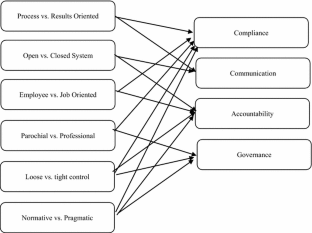Abstract
Information security cannot rely solely on technology. More attention must be drawn to the users’ behavioral perspectives regarding information security. In this study, we propose that a culture encouraging employees to comply with information policies related to collecting, preserving, disseminating and managing information will improve information security. Information security culture is believed to be influenced by an organization’s corporate culture (or organizational culture). We examine how this occurs through an in-depth case study of a large organization. We present a relationship map for organizational culture and information security practices. Six propositions are drawn from the findings of our interviews and discussions. Managerial insights, such as how to measure an organization’s information security culture and subsequently determine what perspective(s) is important for the organization to improve, are also discussed.


Similar content being viewed by others
References
Akkermans H, van Helden K (2002) Vicious and virtuous cycles in ERP implementation: a case study of interrelations between critical success factors. Eur J Inform Syst 11(1):35–46
Carr NG (2003) It doesn’t matter. Harv Bus Rev 41(9):5–12
Chang S, Lin C (2007) Exploring organizational culture for information security management. Ind Manag Data Syst 107(3):438–458
Crossler R, Johnston A, Lowry P, Hu Q, Warkentin M, Baskerville R (2013) Future directions for behavioral information security research. Comput Secur 32(1):90–101
Deal T, Kennedy A (1982) Corporate cultures: the rites and rituals of organizational life. Addison-Wesley, Boston
Eisenhardt K (1989) Building theories from case study research. Acad Manag Rev 14:532–550
Hedström K, Kolkowska E, Karlsson F, Allen JP (2011) Value conflicts for information security management. J Strateg Inf Syst 20:373–384
Helokunnas T, Kuusisto R (2003) Information security culture in a value net. In: IEEE Engineering management conference, 2003. IEMC'03. Managing technologically driven organizations: the human side of innovation and change, pp 190–194
Herath T, Rao H (2009) Encouraging information security behaviors in organizations: role of penalties, pressures and perceived effectiveness. Decis Support Syst 47(2):154–165
Hofstede G (1998) Identifying organizational subcultures: an empirical approach. J Manage Stud 35(1):1–12
Hofstede G, Neuijen B, Ohayv D, Sanders G (1990) Measuring organizational cultures: a qualitative & quantitative study across twenty cases. Adm Sci Q 35(2):286–316
Ifinedo P (2012) Understanding information systems security policy compliance: an integration of the theory of planned behavior and the protection motivation theory. Comput Secur 31(1):83–95
Kanungo S, Sadavarti S, Srinivas Y (2001) Relating IT strategies & organizational culture: an empirical study of public sector units in India. J Strateg Inf Syst 10(1):29–57
Kokolakis S, Karyda M, Kiountouzis E (2005) The insider threat to information systems and the effectiveness of ISO17799. Comput Secur 24(6):472–484
Kraemer S, Carayon P, Clem J (2009) Human and organizational factors in computer and information security: pathways to vulnerabilities. Comput Secur 28(3):509–520
Lacey D (2010) Understanding and transforming organizational security culture. Inf Manag Comput Secur 18(1):4–13
Leidner D, Kayworth T (2006) A review of culture in information systems research: toward a theory of information technology culture conflict. MIS Q 30(2):357–399
Mcllwraith A (2006). Information security and employee behaviour: how to reduce risk through employee education, training and awareness. Gower Publishing Company, Burlington
Schlienger T, Teufel S (2003) Information security culture - from analysis to change. S Afr Comput J 31:46–52
Thomson K, von Solms R, Louw L (2006) Cultivating an organizational information security culture. Comput Fraud Secur 2006(10):7–11
Veiga A, Martins N, Eloff J (2007) Information security culture-validation of an assessment instrument. S Afr Bus Rev 11(1):147–166
Vroom C, Von Solms R (2004) Towards information security behavioral compliance. Comput Secur 23(3):191–198
Werlinger R, Hawkey K, Beznosov K (2009) An integrated view of human, organizational, and technological challenges of IT security management. Inf Manag Comput Secur 17(1):4–19
Yin RK (2003), Applications of case study research, 2nd edn. Sage, Thousand Oaks
Acknowledgments
This study is part of the projects ‘Research on China Industrial Security Index’ (No. B09C1100020) and “Industrial Security Engineering Research” (No. 239010522) funded by the Ministry of Education, China. We appreciate the supportive comments from the reviewers.
Author information
Authors and Affiliations
Corresponding author
Rights and permissions
About this article
Cite this article
Tang, M., Li, M. & Zhang, T. The impacts of organizational culture on information security culture: a case study. Inf Technol Manag 17, 179–186 (2016). https://doi.org/10.1007/s10799-015-0252-2
Published:
Issue Date:
DOI: https://doi.org/10.1007/s10799-015-0252-2




